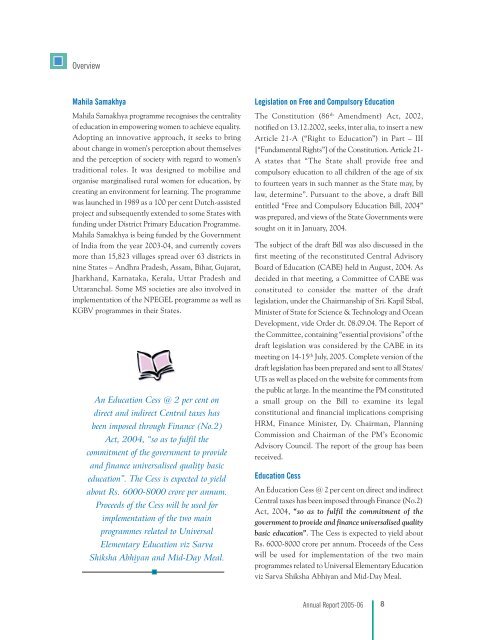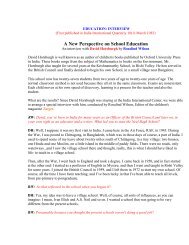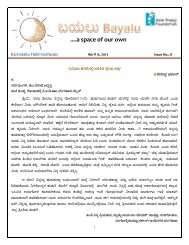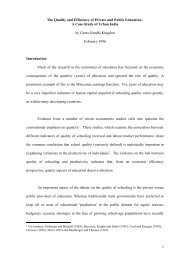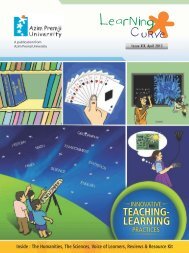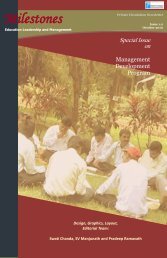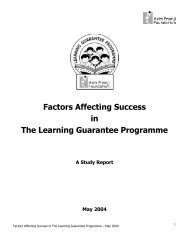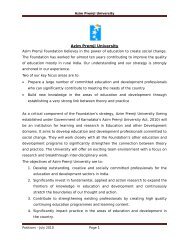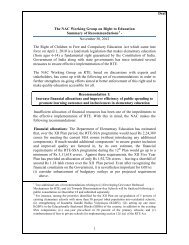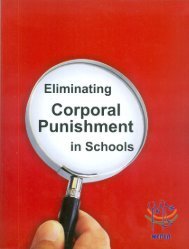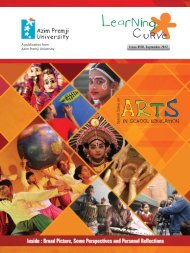all files - Azim Premji Foundation
all files - Azim Premji Foundation
all files - Azim Premji Foundation
Create successful ePaper yourself
Turn your PDF publications into a flip-book with our unique Google optimized e-Paper software.
Overview<br />
Mahila Samakhya<br />
Mahila Samakhya programme recognises the centrality<br />
of education in empowering women to achieve equality.<br />
Adopting an innovative approach, it seeks to bring<br />
about change in women’s perception about themselves<br />
and the perception of society with regard to women’s<br />
traditional roles. It was designed to mobilise and<br />
organise marginalised rural women for education, by<br />
creating an environment for learning. The programme<br />
was launched in 1989 as a 100 per cent Dutch-assisted<br />
project and subsequently extended to some States with<br />
funding under District Primary Education Programme.<br />
Mahila Samakhya is being funded by the Government<br />
of India from the year 2003-04, and currently covers<br />
more than 15,823 villages spread over 63 districts in<br />
nine States – Andhra Pradesh, Assam, Bihar, Gujarat,<br />
Jharkhand, Karnataka, Kerala, Uttar Pradesh and<br />
Uttaranchal. Some MS societies are also involved in<br />
implementation of the NPEGEL programme as well as<br />
KGBV programmes in their States.<br />
An Education Cess @ 2 per cent on<br />
direct and indirect Central taxes has<br />
been imposed through Finance (No.2)<br />
Act, 2004, “so as to fulfil the<br />
commitment of the government to provide<br />
and finance universalised quality basic<br />
education”. The Cess is expected to yield<br />
about Rs. 6000-8000 crore per annum.<br />
Proceeds of the Cess will be used for<br />
implementation of the two main<br />
programmes related to Universal<br />
Elementary Education viz Sarva<br />
Shiksha Abhiyan and Mid-Day Meal.<br />
Legislation on Free and Compulsory Education<br />
The Constitution (86 th Amendment) Act, 2002,<br />
notified on 13.12.2002, seeks, inter alia, to insert a new<br />
Article 21-A (“Right to Education”) in Part – III<br />
[“Fundamental Rights”] of the Constitution. Article 21-<br />
A states that “The State sh<strong>all</strong> provide free and<br />
compulsory education to <strong>all</strong> children of the age of six<br />
to fourteen years in such manner as the State may, by<br />
law, determine”. Pursuant to the above, a draft Bill<br />
entitled “Free and Compulsory Education Bill, 2004”<br />
was prepared, and views of the State Governments were<br />
sought on it in January, 2004.<br />
The subject of the draft Bill was also discussed in the<br />
first meeting of the reconstituted Central Advisory<br />
Board of Education (CABE) held in August, 2004. As<br />
decided in that meeting, a Committee of CABE was<br />
constituted to consider the matter of the draft<br />
legislation, under the Chairmanship of Sri. Kapil Sibal,<br />
Minister of State for Science & Technology and Ocean<br />
Development, vide Order dt. 08.09.04. The Report of<br />
the Committee, containing “essential provisions” of the<br />
draft legislation was considered by the CABE in its<br />
meeting on 14-15 th July, 2005. Complete version of the<br />
draft legislation has been prepared and sent to <strong>all</strong> States/<br />
UTs as well as placed on the website for comments from<br />
the public at large. In the meantime the PM constituted<br />
a sm<strong>all</strong> group on the Bill to examine its legal<br />
constitutional and financial implications comprising<br />
HRM, Finance Minister, Dy. Chairman, Planning<br />
Commission and Chairman of the PM’s Economic<br />
Advisory Council. The report of the group has been<br />
received.<br />
Education Cess<br />
An Education Cess @ 2 per cent on direct and indirect<br />
Central taxes has been imposed through Finance (No.2)<br />
Act, 2004, “so as to fulfil the commitment of the<br />
government to provide and finance universalised quality<br />
basic education”. The Cess is expected to yield about<br />
Rs. 6000-8000 crore per annum. Proceeds of the Cess<br />
will be used for implementation of the two main<br />
programmes related to Universal Elementary Education<br />
viz Sarva Shiksha Abhiyan and Mid-Day Meal.<br />
Annual Report 2005-06<br />
8


